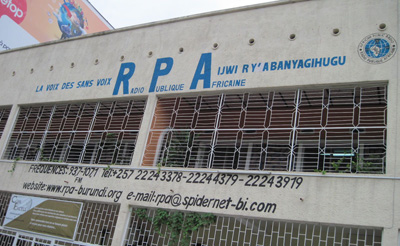After 2006, Burundi’s government and media relations seemed promising. The airwaves had been open to private broadcasters for years; the president held frequent press conferences, and the government commended the unified press for its professional 2010 pre-election coverage. “The president had organized an open dialogue with the press before the elections,” Information Minister Concilie Nibigira told CPJ. “It is the only country I know who would hold regular meetings with the media.”
The press organized a joint election coverage program called “Media Synergy” that encouraged peace and responsible reporting for the historic four-part (presidential, parliamentary, regional, and legislative) 2010 elections. “The idea was to create one newsroom out of all various press houses,” journalist Onésime Niyugenko told me, “so that reporters would be deployed across the country to ensure full coverage and balanced reporting.”
But at some point during the 2010 elections, the relationship soured. The government started replicating practices of former Burundi leaders–targeting journalist with threats, physical attacks, and arbitrary arrests. “The starting point for poor relations between the media and the government was during the elections,” First Vice President Therence Sinunguruza told CPJ. “There were bad losers and good winners. The results were rejected; that is where media relations started to fall.”
All opposition parties rejected the results of the municipal elections in May. They claimed electoral fraud by the ruling party and boycotted the rest of the elections. There was only one candidate running in the June presidential race: incumbent President Pierre Nkrunziza. After all the opposition parties fled the country later in the year, the government began to view the press as the last hostile forces left standing.
“The media is now considered part of the opposition,” said Pacifique Nininahazwe, head of a civil society umbrella group called the Forum for the Reinforcement of Civil Society (FORSC). “Now if you do an interview with the former rebels, the National Liberation Forces (FNL), the radio station is labeled as opposition.”
Antoine Kaburahe, the chief editor of the independent weekly Iwacu, noticed the change. “We no longer have access to information. Ministers refuse to see you since we are considered the enemy,” he said. “Since the opposition left, the media is now the frontline.”
Sensitive topics such as corruption and security are no-go areas for their paper, Kaburahe said. “We tend to tackle the small cases of corruption but never the big ones.” Iwacu targets civil servants, Kaburahe said, but gives a pass to the greatest perpetrators of corruption–senior politicians. Police arrested two Iwacu reporters, Elyse Ngabire and Dieudonné Hakizimana, in November after they visited a prominent member of the former rebel National Liberation Forces (FNL) member in prison. “We were working on a special edition on political prisoners,” Kaburahe explained. “The prisoner tried to hand the reporters a letter but a guard spotted them and had them jailed over the weekend.” Kaburahe said the letter contained a list of FNL members in prison–a document he said is well known and easily attained. The journalists, one who was nursing an infant child, were placed in solitary confinement with no legal access for two days before being released.
The online news editor of Netpress, Jean-Claude Kavumbagu, has remained in pre-trial detention since July 17 on treason charges that can only apply during war-time. But Burundi is not at war. “Even the prosecution admitted Burundi is not at war,” Kavumbagu’s defense lawyer Gabriel Sinarinzi told CPJ. “I have a feeling this case is politicized.”
Kavumbagu’s brother, civil society activist Jean-Marie Kavumbagu, agrees. The judge ruled that Kavumbagu must remain in prison to ensure he attends future court sessions and “for his own protection.” “What sort of protection does he have in a prison that has 20 toilets for every 200 inmates?” the brother asked. Certain individuals within the government concede that there are flaws in the Burundi justice system and in Kavumbagu’s trial in particular. As the former justice minister and with 15 years experience as a magistrate, Vice President Sinunguruza admitted to CPJ in a recent meeting in the capital, Bujumbura, that Kavumbagu’s trial proceedings were in breach of the country’s laws.
Kavumbagu told CPJ during our visit to his Bujumbura prison a couple weeks ago that “if a ruling is not in favor with the government, judges are transferred to the provinces.” In 2008, the online editor was arrested for an article that claimed the president overspent on his presidential visit to Beijing for the Olympic Games. The judge who ruled in favor of Kavumbagu’s release was transferred to the countryside, a hardship post, Jean-Marie Kavumbagu told CPJ.
The lack of an independent justice system forces Burundi journalists to self-censor for survival, local journalists said. The practice is common, said Alexandre Niyungeko, president of the Burundi Journalist Union, especially for the private media. Recently the police chief even told the press not to write on issues of public security, Niyungeko said, just after suspected rebels orchestrated an attack in northern Burundi.
There is hope, however, that relations between the government and the press may improve after a multi-stakeholder conference between the media and government is expected to take place in February next year, Minister Nibigira told CPJ. The government certainly needs to return to its formerly positive press freedom record if they want continued public support. According to a national survey released in December, 65 percent of the populace wants press freedom and the decriminalization of press offenses. But until relations between the government and media improve, the united Burundi press will continue to fend for itself.
Often the different media groups agree to publish the same sensitive stories simultaneously, Kaburahe told CPJ. “We do this protect one another,” he said. “We cannot release sensitive information alone, but if we are all covering the same topic, it becomes harder to stop us.”
